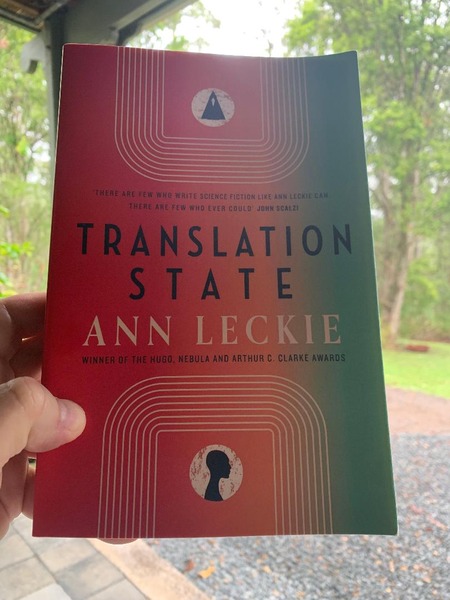(read at Pindari cabin, Yeranda Cottages, Dungog, 2-9 January 2024)
We often associate identity with what are on the surface reasonably superficial things – name, dress style, choice phrases, interests and hobbies; they all matter, of course, because they express who we are but they pale in comparison with the defining sense that comes with who we belong to.
People join clubs, embrace religions and subscribe to all kinds of belief systems in the hope that this will give meaning and purpose, but more crucially, a sense of identity that exists beyond the personal.
But as Ann Leckie observes with incisively empathetic force in Translation State, this sense of belonging, while important, always has to go hand-in-hand with a strong sense of self or you risk subsuming yourself to an obliterating degree in the very thing that is meant to bolster, not erase, your sense of identity.
Set in the author’s Imperial Ranch universe, a far future in which humanity has well and truly colonised the stars, is in a thousand-year-old treaty with the mysterious Presger, and is constant contact with alien races such as the Neck and the Rrrrrr, Translation State is a thrillingly intense exploration of how we are shaped and defined by family, and how belonging and identity work together in ways that can either elevate who we are or doom it to oblivion.
It’s a fascinating exercise that reveals how much we are willing to give up to belong, and what happens when that quest to be part of something bigger than ourselves leads us to us always being wiped off the face of the universe.
This is what the Teachers tell you: when you exit into the World, you’ll take the place you’ve been prepared for since birth, each of us chosen for our suitability, without reference to favoritism or any sort of partiality. Each role is necessary and noble, part of our great work, and we will be happy and fulfilled.
It’s all a lie.
There are three central characters in Translation State, all of whom must wrestle to reasonably substantial degrees with impaired or incomplete senses of self.
Even is what a juvenile Presger Translator, the shining star of their clade aka family whose sole goal all her life has been to ascend to the ranks of those of her race who stand as intermediaries between the sprawling reach of humanity and the Presger whose presence is so dangerous they require a treaty to contain them.
Hers is a tightly constrained and rigidly defined life, one which allows little room for free thinking or individuality and which rests on absolute adherence and obedience, something which Qven imperils when she begins to think about what it would be like to walk away and define herself on her own terms.
This highly rebellious thinking process which begets some status quo upsetting actions leads her into contact with Rest, a human who arrived at Rurusk Station (in the Sovereign Territory of Zoesen) on which he lives many years as an infant, one stripped of identity, race and any real sense of who he is.
He is loved by his adoptive family, who stand for him in what becomes his hour of need with a fierce determination and love that makes it clear genetics alone do not define who we are or to whom we belong, but he can’t shake the feeling that something is missing, something that would explain strange urges and dreams and even physiological reactions that unnerve him.
(courtesy official author site)
The other person who enters Qven’s orbit is Enae, a woman who has devoted her stunted life in the Sadness Polity to caring for her cold, gruff grandmother, a rich woman who rules her household and extended family so ruthlessly that she has alienated just about everyone she loves.
Save for Enae who emerges from the turbulent aftermath of her grandmother’s death with very little sense of purpose and a hollowing sense that she has achieved little to nothing with her life, and who takes on an assignment by a surprisingly significant new figure in her life, to investigate a centuries-old diplomatic cold case, like a desperately drowning person clinging to a life buoy.
She has little else to do and takes to her new role as a diplomat with the sort of intensity and love of detail that she brought to caring for her grandmother, and it’s this unwillingness to simply tick the box and go through the motions that brings her into contact, first with Rest and then with Qven.
Together all three people stand to have a massive influence on the upcoming renegotiation of the human-Presger Treaty simply by exercising their right to determine who they are and how it is they want their lives to run.
Theirs is a graphically important collision of personal identity and group politics and as Translation State progresses, it becomes clear that you cannot have one without the other.
‘You’re the one who brought then into the committee room,’ Reet pointed out. ‘Not me, not Qven. Not my parents.’
Ambassador Seimet looked like she wanted to argue with that, to say something sneering or insulting, but she had nothing.
Oh, plenty of people in the novel try and their attempts to railroad through maintenance of the existing order in stark disregard for the rights of the individual or their sense of identity and belonging makes for a brilliantly persuasive and oft-times moving read.
Translation State is that rare book that balances messaging and story to impressive degree, and as you learn more about Qven, Reet and Enae and how their interscting life journeys will affect the other, it’s impossible not to be impressed by the rich degree of humanity that Leckie brings to her story.
As space opera goes, this is masterful storytelling right up with the best, a story that embraces the vital importance of personal identity and the driving need we all have to belong and maintains that yielding that to the greater good simply because it says it is greater and is good – how do you know either is true? – is a perilous and dangerous course of action.
Translation State reminds us to a powerful and intimately affecting degree that fighting for who we are matters, especially when the rich and powerful try to coerce and abuse it for their own ends.
Community and society are important and they do matter but not at the expense of who we are and the lives we want to lead, and Translation State makes a moving and intensely persuasive case for the fact that for the greater polity to work, it must respect and value those who make it up or risk losing everything that defines it in the first place.
Getting to know Reet, Qven and Enae is a joy because not only are their journeys to palpable, transformative sense of self the stuff of excitingly immersive reading, but because they speak to the power that comes from not only knowing who we are but fighting for our right to be that person and the amazing and life-changing things that can and do flow from that.

